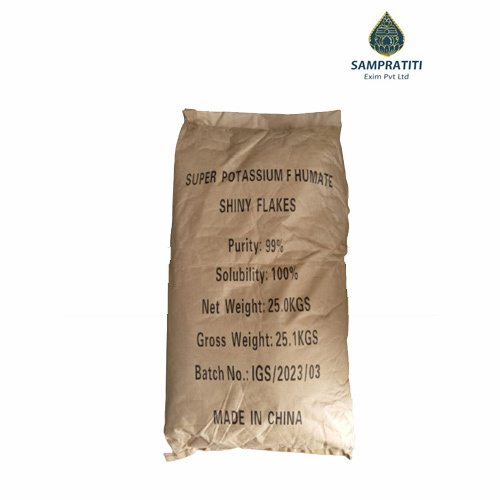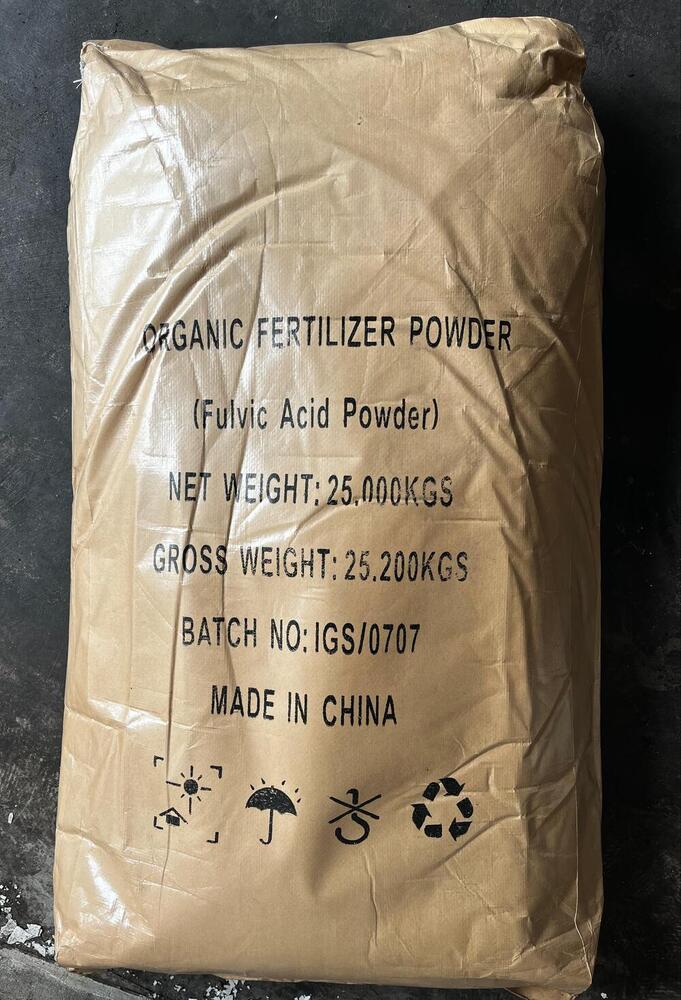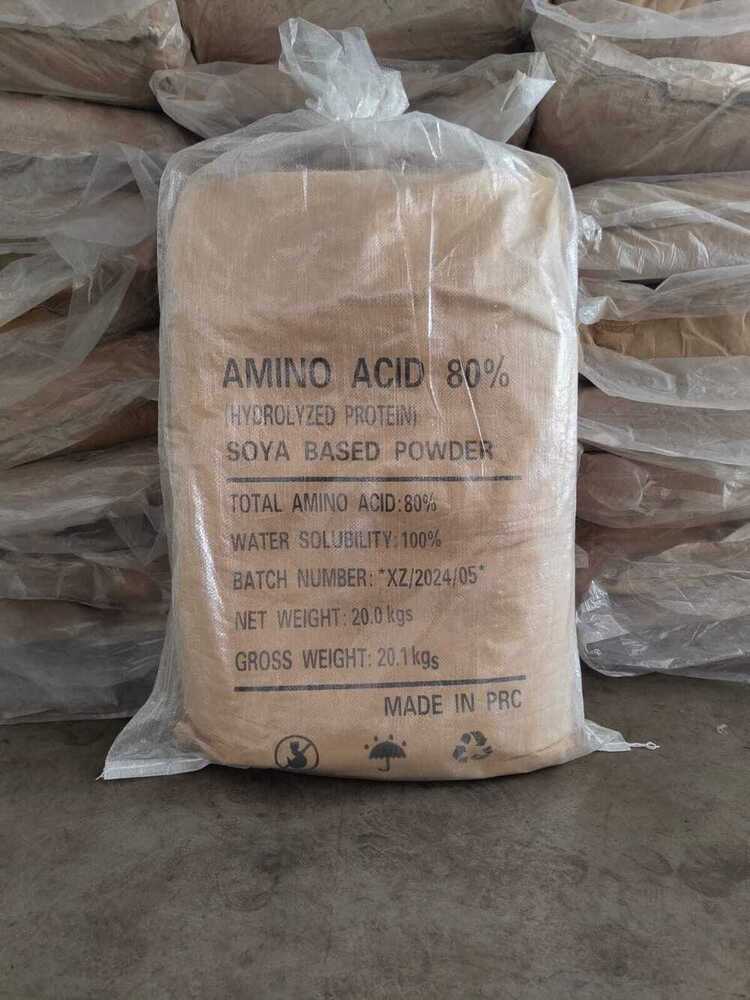AMINO ACID 50%
Product Details:
- Place of Origin CHINA
- Color BROWN POWDER
- Moisture (%) 1.83%
- Ph Level 4.5
- Click to View more
AMINO ACID 50% Price And Quantity
- 60.00 - 65.00 INR/Kilograms
- 100 Kilograms
- 62 INR/Kilograms
AMINO ACID 50% Product Specifications
- CHINA
- BROWN POWDER
- 1.83%
- 4.5
AMINO ACID 50% Trade Information
- All India
Product Description
Amino acid fertilizers are a type of plant supplement that provides essential amino acids to plants. Amino acids are organic compounds that serve as the building blocks of proteins, which are essential for plant growth and development. In agriculture, amino acid fertilizers are used to enhance plant health by improving nutrient uptake, increasing resistance to stress, and stimulating growth.
Unlike traditional synthetic fertilizers, amino acid fertilizers are derived from natural sources such as plant or animal proteins, or they may be produced through microbial fermentation. These fertilizers are especially beneficial in promoting better root development, improving plant resilience, and supporting overall plant metabolism.
Facts about Amino Acid Fertilizers:
-
Improves Nutrient Uptake:
- Amino acids are essential for various metabolic processes in plants, including the synthesis of proteins, enzymes, and hormones. Amino acid fertilizers can enhance nutrient uptake and help the plant efficiently use the nutrients available in the soil.
-
Stimulates Growth:
- Amino acids play a crucial role in cell division and elongation, which supports the overall growth and development of plants. They help in faster seedling growth, robust root development, and greater overall plant health.
-
Enhances Stress Tolerance:
- Amino acid fertilizers help plants cope with environmental stress factors such as drought, extreme temperatures, salinity, and pest attacks. They do this by boosting the plant™s internal defense mechanisms and improving overall plant resilience.
-
Supports Photosynthesis:
- Amino acids are involved in the formation of chlorophyll, the green pigment responsible for photosynthesis. By promoting the synthesis of chlorophyll, amino acid fertilizers can improve photosynthesis, leading to healthier plants.
-
Improves Soil Microbial Activity:
- Amino acid fertilizers can stimulate beneficial soil microbes, helping to break down organic matter more effectively. This increases the availability of nutrients and improves overall soil fertility.
-
Enhances Plant Immunity:
- Amino acids like glutamine and proline have been shown to help plants build a stronger immune response against pathogens, diseases, and pests. This leads to improved plant health and reduced susceptibility to infections.
-
Eco-friendly:
- Amino acid fertilizers are often considered more environmentally friendly than synthetic fertilizers. They are biodegradable, reduce the need for chemical pesticides, and can be used in organic farming.
-
Increases Yield and Quality:
- Regular use of amino acid fertilizers can enhance plant productivity, leading to better yields in crops like vegetables, fruits, and grains. Additionally, they improve the quality of the produce, making it healthier and more nutritious.
Questions and Answers about Amino Acid Fertilizers:
-
What are amino acid fertilizers?
- Amino acid fertilizers are supplements made from amino acids, the building blocks of proteins. These fertilizers are used to improve plant growth, nutrient absorption, stress tolerance, and overall plant health.
-
How do amino acid fertilizers work?
- Amino acid fertilizers work by providing plants with amino acids, which help in synthesizing proteins, enzymes, and other important molecules. They promote better growth, increase resistance to stress, and improve nutrient uptake by enhancing plant metabolism.
-
Can amino acid fertilizers be used in organic farming?
- Yes, amino acid fertilizers are often used in organic farming. They are natural and biodegradable, making them suitable for organic agriculture. They provide plants with essential nutrients without the need for synthetic chemicals.
-
What are the benefits of using amino acid fertilizers?
- Amino acid fertilizers improve nutrient uptake, enhance stress tolerance, support photosynthesis, promote root development, and increase plant immunity. They also lead to higher crop yields and improved quality of the produce.
-
Are amino acid fertilizers safe for plants?
- Yes, amino acid fertilizers are generally safe for plants when used correctly. They provide plants with necessary nutrients and do not contain harmful chemicals. However, over-application can lead to nutrient imbalances, so it is important to follow recommended guidelines.
-
How are amino acid fertilizers applied?
- Amino acid fertilizers can be applied in several ways: foliar sprays, root drenching, or as part of the soil amendment process. They are often diluted with water and sprayed directly onto the plant™s leaves or applied to the soil around the roots.
-
What types of plants benefit most from amino acid fertilizers?
- Amino acid fertilizers are beneficial for a wide range of plants, especially those that are under stress due to drought, temperature fluctuations, or pest attacks. They are commonly used on high-value crops like fruits, vegetables, and flowers to improve growth and quality.
-
Can amino acid fertilizers be used in combination with other fertilizers?
- Yes, amino acid fertilizers can be used in conjunction with other fertilizers, both organic and synthetic. They help improve the absorption of other nutrients and enhance the effectiveness of other soil amendments.
-
How do amino acid fertilizers improve stress tolerance in plants?
- Amino acids like proline help plants retain water, making them more drought-resistant. Amino acids also strengthen plant cell walls and improve internal signaling pathways that allow plants to respond more effectively to stress from heat, cold, and pest attacks.
-
Are amino acid fertilizers environmentally friendly?
- Yes, amino acid fertilizers are considered environmentally friendly because they are natural, biodegradable, and non-toxic. They reduce the need for synthetic fertilizers and pesticides, contributing to more sustainable agricultural practices.
-
Can amino acid fertilizers help with soil health?
- Yes, amino acid fertilizers improve soil health by stimulating the activity of beneficial soil microbes. These microbes break down organic matter more efficiently, making nutrients more available to plants and enhancing soil fertility.
-
Are amino acid fertilizers expensive?
- While amino acid fertilizers can be more expensive than traditional synthetic fertilizers, they offer long-term benefits like improved plant health, better yields, and reduced dependency on synthetic chemicals, which can make them cost-effective in the long run.
Amino acid fertilizers offer a natural and effective way to boost plant growth, improve resilience, and enhance nutrient uptake. Their use in agriculture promotes sustainability and eco-friendly practices while improving plant health and productivity.

Price:
- 50
- 100
- 200
- 250
- 500
- 1000+







